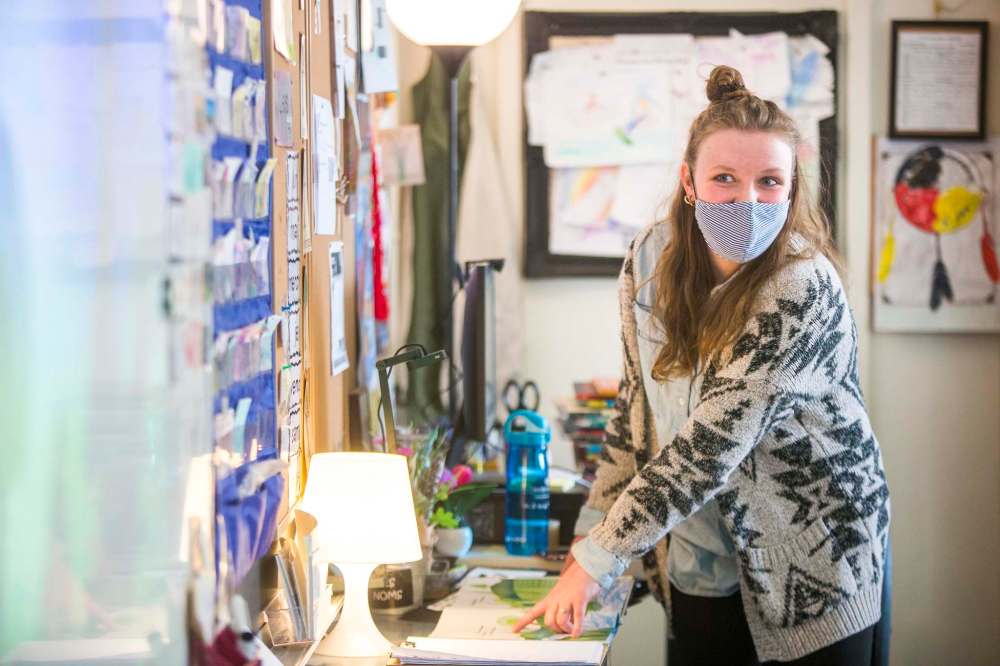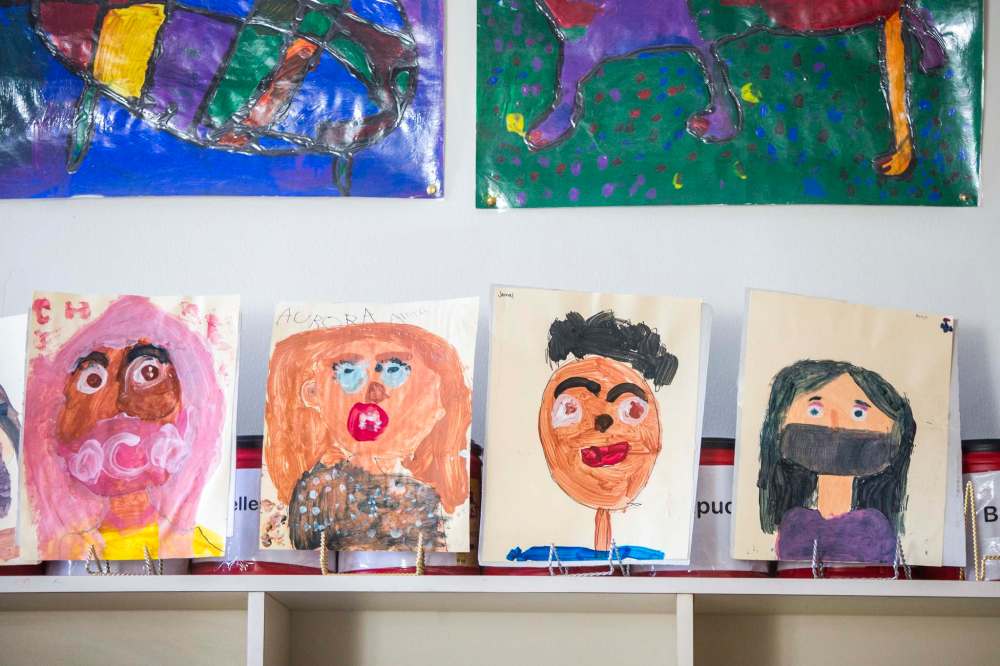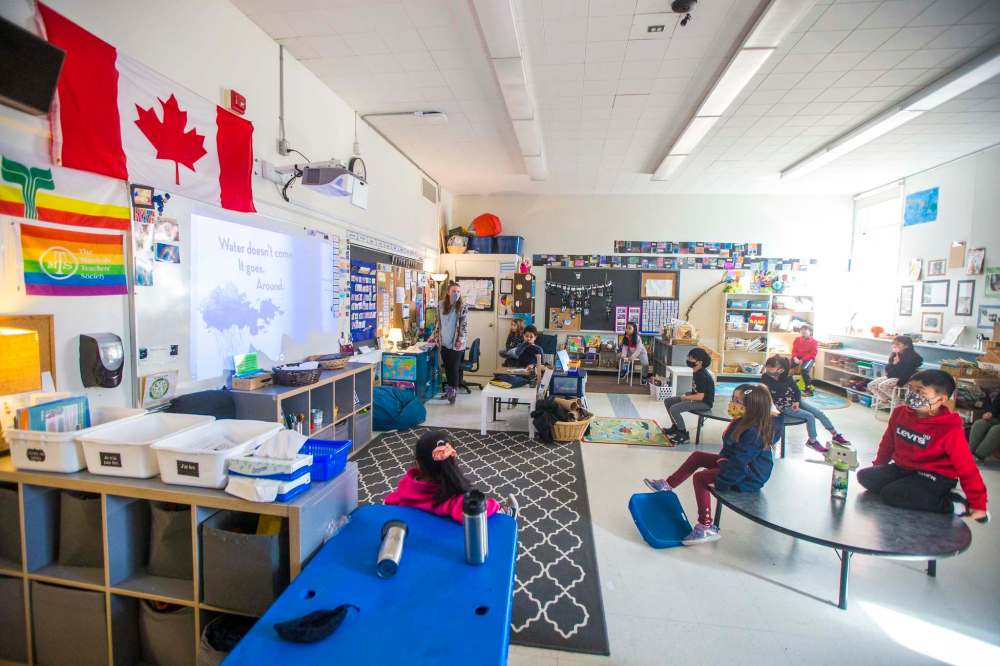Lessons from a pandemic
COVID-19 expected to have lasting influence on Manitoba education system
Advertisement
Read this article for free:
or
Already have an account? Log in here »
To continue reading, please subscribe:
Monthly Digital Subscription
$1 per week for 24 weeks*
- Enjoy unlimited reading on winnipegfreepress.com
- Read the E-Edition, our digital replica newspaper
- Access News Break, our award-winning app
- Play interactive puzzles
*Billed as $4 plus GST every four weeks. Offer only available to new and qualified returning subscribers. Cancel any time.
Read unlimited articles for free today:
or
Already have an account? Log in here »
Hey there, time traveller!
This article was published 14/03/2021 (1419 days ago), so information in it may no longer be current.
“Madame, is that what your nose looks like? Can I see?”
An elementary school teacher, Beverley Lunney is no stranger to quirky queries, but this particular line of questioning has stuck with her as a reminder of how dystopian this school year has been amid the COVID-19 pandemic.
It happened before the winter break, when a student who had joined her Grade 1-2 French immersion class at École Belmont one month earlier was staring at a photo of her posted in the classroom doorway. After the grand reveal, a brief moment where Lunney pulled down her mask as proof, her student thanked her and returned to his seat.

“I didn’t realize he literally had only seen half of my face for the entire time that I’d been his teacher. It was such a crazy moment,” said Lunney, who entered her fourth year of teaching this fall, equipped with a stockpile of fun patterned and holiday-themed masks.
“The whole mask thing has been really, really tricky, especially with little kids who are really reliant on those social, facial cues.”
The education system has undergone massive transformations over the last year, ever since the province closed schools, initially, for an optimistic three-week shutdown, to slow the spread of COVID-19.
Masks have since become commonplace, physical distancing markers abundant and handwashing a constant.
The pandemic pushed teachers to quickly adopt new technologies, required students become more independent, and gave parents a closer look into their children’s education. While public health restrictions in schools may be temporary, the lessons taken from 2020-21 won’t be unlearned.
Thomas Falkenberg, acting dean of education at the University of Manitoba, said the most promising educational outcome of the pandemic will likely be the widespread understanding about how to successfully provide remote schooling.
“While in-person experiences will always be the preferred way of teaching and learning, there are situations, where students might actually benefit from more flexible ways of teaching and learning,” Falkenberg said.
At a price tag of $250,000, Pembina Trails School Division purchased 860 webcams for each of its schools’ K-12 learning spaces this year. Teachers have been using the cameras to connect with students who are sick or self-isolating and those doing blended models on home learning days.
The equipment won’t disappear once the pandemic ends, leaving the future of remote learning — to any extent — a possibility in the division.
“Anecdotally, we’re thinking that about 15 per cent of our students will have actually found this approach to education a better match for their own learning style,” said superintendent Ted Fransen.
Fransen added, “We’re going to take the experience that we’ve had this past year and take a hard look at what we can learn from it and how we can better serve the full spectrum of our student population.”

Christian Michalik, superintendent of the Louis Riel School Division, echoed those comments.
“In a post-pandemic world, the student population needing to be home to learn at any given time will be small. It won’t be the size that it is today, but that need was there before the pandemic,” Michalik said. “We want to do better by those children.”
Louis Riel high schools have started collaborating so students across the division can access courses offered at other schools, which aren’t typically provided at their home school, remotely.
Meantime, InformNet, Manitoba’s online high school run by Pembina Trails and St. James-Assiniboia divisions has undergone an unprecedented expansion.
In her early years classroom, Lunney plans to incorporate remote learning by continuing to post assignments on Seesaw — what she calls a “safe Facebook” — so parents can see what their kids are up to, and kids can follow along at home if they have to miss school.
It’s been one of her several successful new pandemic practices, along with outdoor learning sessions and a document camera, which she uses during read-alouds to project text and photos onto a classroom wall.
Typically, parents get involved in their children’s education through the lens of behaviour, whether that be to ensure their child is paying attention in class or being supported, said Betheny Gross, associate director of the Center on Reinventing Public Education at the University of Washington.
“(The pandemic) has created an unprecedented two-way mirror in between homes and schools that could be leveraged for great benefit,” said Gross, who has been researching how the COVID-19 era could impact the future of public education.
Over the last year, Gross said parents have been emboldened and empowered by their new understanding about how their kids learn. At the same time, she said teachers have a more comprehensive understanding about what’s going on in their students’ lives and individualized education has become increasingly popular.
“Some kids have their own space, a home, their own room to study in, breakfast ready and prepared, a refrigerator full of food. They are given a much fuller opportunity to engage in their learning than kids who may not have those,” she said, over the phone from Seattle.
That reality has raised questions about the fairness of traditional grading, as well as the recovery learning and mental health supports needed to catch students up.

Ron Rivers, a Grade 5-6 teacher at Ralph Maybank School, said he’s been surprised by how well both staff and students have adjusted during the pandemic. But Rivers, a teacher of nearly 40 years, said he has also become very aware of his students’ mental health this year.
He’s incorporated lessons focused on student well-being and self esteem, in recognition of how stressful this year has been for families.
Despite the challenges Harkeerat Kaur has faced since March 2020 — the biggest one being the inability to see or hug friends, the 10-year-old said she’s actually had “a lot of fun” this year.
The Grade 5 student joined both the art and Minecraft club at Louis Riel’s Learning from Home School, learned how to use various computer programs, and conducted virtual puppet shows with new friends she’s met in her online class.
Kaur said she felt shocked when Island Lakes Community School, alongside every other school in the province, closed because of the pandemic last year. If she could go back in time and soothe her nerves, the advice she would give herself is simple: “You just have to wait and learn and be confident.”
maggie.macintosh@freepress.mb.ca
Twitter: @macintoshmaggie

Maggie Macintosh
Reporter
Maggie Macintosh reports on education for the Winnipeg Free Press. Funding for the Free Press education reporter comes from the Government of Canada through the Local Journalism Initiative.
Our newsroom depends on a growing audience of readers to power our journalism. If you are not a paid reader, please consider becoming a subscriber.
Our newsroom depends on its audience of readers to power our journalism. Thank you for your support.

